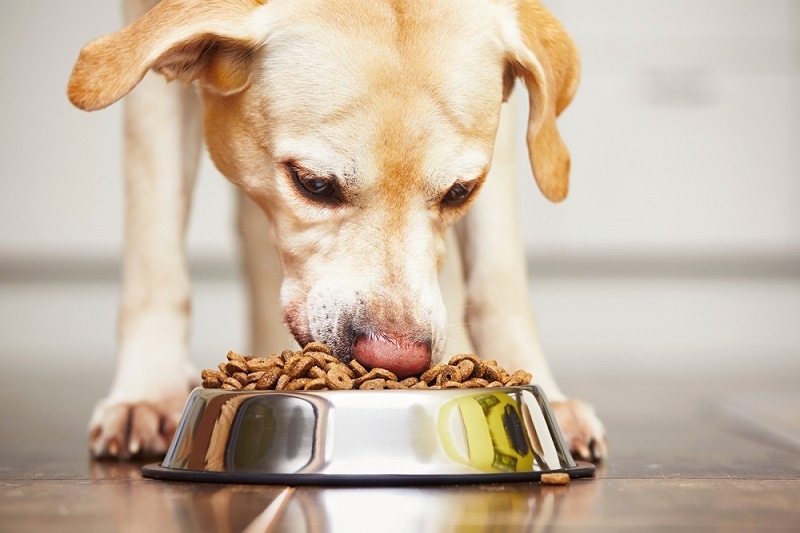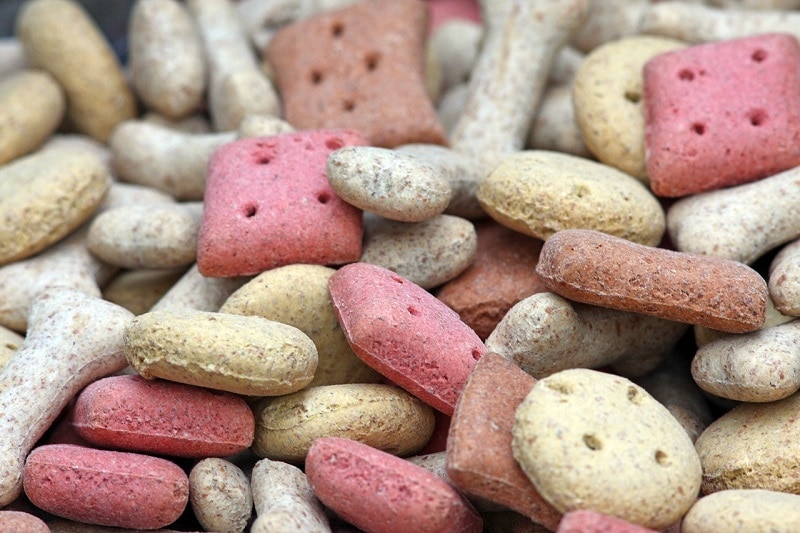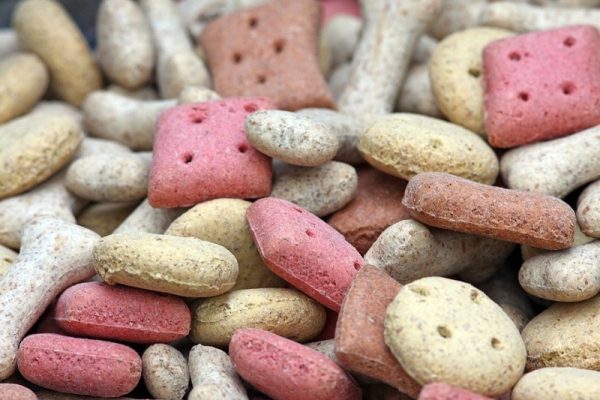Click to Skip Ahead
DL-Methionine, a form of the amino acid methionine, is found in many commercial dog foods and other dog treats and products. Methionine is vital to the proper functioning of the body, and DL-Methionine is a synthetic version of this amino acid.
In this article, we cover the following questions: Is DL-Methionine beneficial? Does it need to be in dog food? As a dog owner, should you be taking action to ensure that your dog has more of it in their daily diet? Let’s get to it!
What Is DL-Methionine?
DL-Methionine is the synthetic equivalent of methionine, which is an amino acid that is most often found in meat and meat-based dog foods. It may also have the name L-2-Amino-4 butyric acid, or L-Methionine.
It is an essential amino acid, which means it must come from your dog’s diet because it is not naturally created within the body. There are 10 essential amino acids for dogs. While it is ideal for your dog to get these from natural ingredients, synthetic versions can be cheaper and may even provide optimal levels of the required amino strings.

Benefits
DL-Methionine has a host of benefits for dogs:
- Antioxidant: This amino acid works as an antioxidant. Antioxidants protect cells against free radicals, which in turn, can cause heart disease and may lead to cancer and other diseases. Methionine is also known to detoxify chemicals within the body. Besides preventing potentially fatal diseases, antioxidants can keep a dog looking healthy and young.
- Amino Acid: Amino acids are compounds that are made up of nitrogen, carbon, hydrogen, and oxygen. They are used to form proteins, which can perform any of several roles within the body. Methionine amino acids are specifically known to aid in liver repair.
- Healthy Skin and Nails: The amino acid is a structural part of collagen and other proteins, which are used to form strong skin and nails. A deficiency in these can lead to skin irritation and weak nails. By maintaining healthy levels of DL-Methionine, it is possible to ensure that your dog’s skin and nails remain healthy and strong.
- Histamine Reduction: Histamine is used by the body to trigger an immune response. This is an important role in the body, but if your dog suffers from allergies, they are essentially producing histamine when it is not needed. This is why dogs with allergies may be prescribed antihistamines, as these prevent the allergic response of the immune system. Methionine limits the amount of histamine that your dog produces, which can alleviate allergic reactions.
Uses
As one of the essential amino acids, methionine is considered a vital component in a dog’s diet. It is found in meat and is one of the reasons that dogs are ideally fed a diet that is high in meat protein. While it is present in some plant proteins, it is in much lower quantities.

Certain foods that are low in meat protein but high in vegetable protein will supplement methionine levels with the synthetic DL-Methionine equivalent, whereas foods that are sufficiently high in meat and fish proteins do not need this additional supplementation.
You may also find a few supplements and treatments that include DL-Methionine.
Side Effects
Although methionine is an essential amino acid, you need to ensure that you do not feed too high levels of the protein to your dog. Excessive levels can cause:
- Hardening of the Arteries: Atherosclerosis is a hardening of the arteries caused when a substance builds up in the artery walls. In this case, excessive methionine can build up and cause these plaques. If a plaque breaks off, this can cause a blood clot. Artery hardening can also lead to heart attack, stroke, and even heart failure.
- Exacerbation of Liver Disease: Liver disease means the liver is no longer able to fully perform its functions. While methionine is effective at helping the liver recover from damage and can even strengthen the organ, if too much methionine is given, it can have the opposite effect and cause a worsening of liver damage.
How to Take It
Natural methionine is better for dogs than synthetic. Their bodies are better able to ingest and use the amino acid, but since it is found in low quantities in vegetables, food manufacturers must add the DL-Methionine synthetic equivalent to low-protein foods. It typically isn’t necessary if your dog has adequate levels of meat or fish. You can also buy supplements and even treats that are rich in this protein.

Conclusion
Methionine is an essential amino acid, which means your dog is unable to produce it naturally and must get the required amounts from their diet. DL-Methionine is the synthetic equivalent and is found in many commercial dog foods, especially those that are low in meat protein and high in plant-based protein. You can also buy methionine supplements that can be fed to your dog daily.
See Also:
- Apple Cider Vinegar for Dogs: 9 Uses & Benefits
- Benefits of Venison in Dog Food
- BHA and BHT: Dog Food Ingredients to Avoid
Featured Image Credit: freddie10, Pixabay










